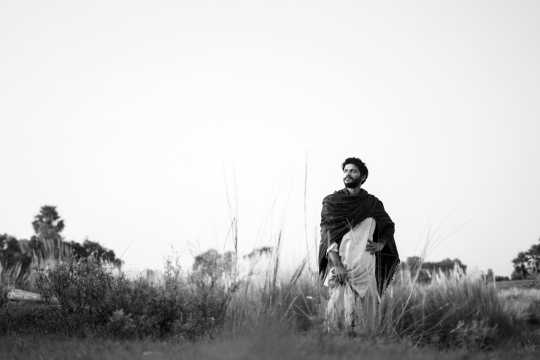
Roushni Sarkar
Kolkata, 04 Dec 2021 13:11 IST
However, the languidly paced movie, aimed at offering a meditative experience, lacks cinematic detailing.

Subhrajit Mitra’s Avijatrik (2021), based on the concluding part of Bibhutibhushan Bandopadhyay’s novel Aparajito, attempts to capture the theme of universality inherent in the author’s writing.
Though the film takes off from where Satyajit Ray’s Apu trilogy ended with Apur Sansar (1959), it mostly refers to the master’s work for recreating certain cinematic moments.
The central theme is explored through the persistent conflict in the mind of the protagonist Apu (Arjun Chakraborty) between providing security and stability to his only surviving family member, son Kajol, and his never-ending quest for the vast offerings of life and the world. Even as Apu becomes the most caring father, investing in Kajol’s care and upbringing, his mind continues to wander. He writes down those fleeting imaginary experiences, hoping to publish them sometime.
On his way to Dhumalgarh, where he has taken up the job of a schoolmaster, Apu travels to Kashi (Varanasi) with Kajol. The train journey not only establishes the intimate bond between father and son, but also brings closure to Apu’s friendship with childhood companion Leela (Arpita Chatterjee), who happens to be travelling in the next coupe.
In Kashi, while revisiting the remnants of his childhood, Apu comes across Shankar (Sabyasachi Chakraborty), who reignites his wanderlust and makes him restless. Here, Mitra has incorporated the character of Shankar from another popular adventure story by Bibhutibhushan Bandopadhyay called Chander Pahar (Mountain of the Moon) to add to the theme of Apu's eternal quest. Shankar reminds Apu that life is more than just domestic stability and to understand the true spirit of the colonized country, travelling is a must.

In the rest of the film, Apu oscillates between making Kajol his companion in a vagabond life and leaving him in someone else’s care while witnessing the emerging freedom movement in the country and the crises of the people around, in the backdrop of World War II. A visit to his birthplace Nischindipur helps him clear out the cloud of thoughts in his mind before he embarks on the destined journey.
Set in the 1940s, the long film progresses at a slow pace. The effort in recreating the period is visible. However, while Bandopadhyay’s languid prose was filled with descriptive detailing, the long pauses between minimal dialogues and the turn of events in the cinematic adaptation lack that detailing.
It is also evident that Mitra adopted this pace to reflect Apu’s meditative and absorbing mind. While Arjun Chakraborty delivers the objective with his consistent performance, Bickram Ghosh’s heavy raga-based background score, while pleasing to the ear and celebrating Apu's never-ending romance with life, sometimes hurts the film's contemplative essence.
The incorporation of the character of Aparna (Ditipriya Roy), sometimes as a figment of Apu’s imagination, at other times as his alter ego, is worthy of praise. On the other hand, the glimpses of the freedom movement seem staged.
Arjun Chakraborty pulls off a character that does not go through much dramatic transformation or express multiple shades of emotions. He aces the difficult job of keeping up with the slow pace and conveys his simmering internal turmoil with minimum fuss. His childlike admiration for nature and life are revealed when he comes out of the house to revisit the childhood memory of a storm experienced with his deceased sister Durga decades ago in Nischindipur.
Ditipriya Roy makes her presence felt strongly with her silence and dramatic expressions. Sabyasachi Chakraborty as the wise Shankar with a thirst for lifelong adventure, is the perfect foil for the protagonist.
The rest of the characters, including Arpita Chatterjee’s Leela and Sreelekha Mitra’s Ranu-di, do not leave an imprint on the viewer's mind. Ayushman Mukherjee as Kajol could have been directed better in certain sequences.
While writing the dialogues, Mitra has tried to maintain the authenticity of the period. However, the film is largely saved by the passages originally written by Bandopadhyay and beautifully recited by Arjun Chakraborty, which keep the theme in focus.
Supratim Bhol’s camerawork is at its most impressive when it captures Apu surrendering himself to the wild yet beautiful village storm. He has also paid tribute to Ray by referencing some of his iconic scenes from the Apu trilogy, just as Anoushka Shankar's adaptation of the Pather Panchali theme by her father, the late Pandit Ravi Shankar, invokes nostalgia. Editor Sujay Dutta Roy has made his best efforts to bring out the thematic consistency through the visual collage containing minimum dialogues.
The film doesn’t have many entertaining elements to keep the audience hooked. It only mesmerizes the viewer during the sequences invoking the nostalgia of reading the original novel by Bandopadhyay and feeling the thrill of the author’s astoundingly imaginative detailing and philosophical outlook on the impermanence of life.
Mitra’s Avijatrik is an experimental attempt to pay tribute to the legacy of Bandopadhyay, Ray and Ravi Shankar. Whether the film truly transports the viewer to a different era is best left to those viewers to decide who are not burdened with the memory of having read Bandopadhyay’s works.
Avijatrik was released in theatres across West Bengal on 3 December.

